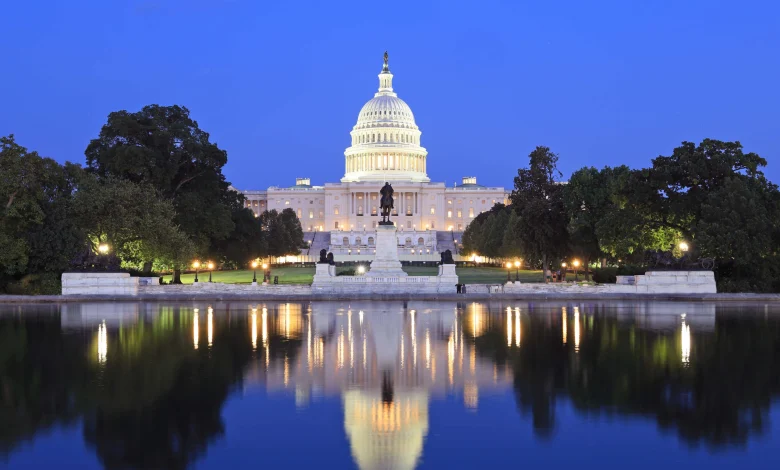Lessons from the shutdown, and what to do before funding runs out again

Terry Gerton We’re all relieved that the government shutdown is over, but I’m really interested in your perspective. You watched it unfold on the Hill for the last seven weeks. What are your takeaways from the discussions and ultimately the resolution?
Mitchell Miller Well, I think, first of all, not surprisingly, everybody agrees that a shutdown is just bad all the way around, with all the impacts that we’ve seen everywhere, with hundreds of thousands of federal workers not getting paid, the delays at the airports, the SNAP issue with people not getting their benefits. So on that, we all agree. Now, what do the parties agree on elsewhere? Nothing, really. I do think from my personal standpoint, having seen these shutdowns before, I think we really know for a fact now that the agitating party, whichever it is, Republican or Democrat, is always going to fall short of what its ultimate goal was. So for example, if you go back to 2013 when Republicans were trying to get rid of the Affordable Care Act, they didn’t quite get there and they eventually didn’t get what they wanted. This time around Democrats got a lot of the things that they wanted in terms of raising the profile of health care and all the issues related to the Affordable Care Act and extending those subsidies. They also got some political boost, of course, from people who didn’t think they fought hard enough the last time, but ultimately they didn’t get exactly what they wanted, which was a guarantee that these subsidies would be extended. So while it can be a somewhat effective way of getting political leverage, it’s obviously the most inefficient way possible to do this. How you sort out whether there are winners or losers here, I think just depends on your political point of view, whether you think Democrats got enough victories to make it worthwhile, whether you are on the more liberal end of the Democratic Party and you think that it was a cave-in and that it’s another bad indicator that the leadership of the Democrat Party doesn’t go far enough. And then on the Republican side, they say, hey, look, we held firm, we had a continuing resolution, and we did what we had to do. So really, there are no particular winners, I think, when you have a government shutdown.
]]>
Terry Gerton That’s a really helpful perspective. One of the threads that kind of kept coming through the whole period was the White House’s various comments on the federal workforce: Would they pay them? Would they not pay them? Would they hold them? Would they fire them? The CR really reaffirms what everybody kind of thought was the rule that regardless of whether you’re furloughed or accepted, you get your back pay. And it reverses the rifts. Do you think this is the beginning, maybe, of Congress taking a more supportive view of the federal workforce, a more engaged perspective?
Mitchell Miller I think so, and here’s an interesting kind of inside look at that. I spoke with Sen. Tim Kaine (D-Va.), who of course was one of the Democratic lawmakers who went along with the new CR in the Senate to get it to the final finish point with the House last week, and what he said was they really hadn’t addressed the federal equation with the employees when he jumped into the negotiations. They had talked about appropriations, they had talked about health care issues, but they hadn’t specifically addressed whether or not federal workers were going to, number one, get back pay, or also whether these RIFs would be rescinded and whether there would be guarantees in the future. And so he pushed very hard for all of those three things. And in his view, that was the most important reason why he ultimately became the deciding vote and got them to the 60 votes to break the filibuster. So I think the fact that the White House was willing to give in a little bit, and as you well know they have not for many, many months, I think this does suggest that there is a little bit more wiggle room than there used to be, and that there IS a shift where members of Congress are now taking a little more of an assertive role.
Terry Gerton Well, that might be a little bit of a silver lining. I guess the other question I wanted to ask you was people expected there would be some pressure points that would work to motivate members of Congress to reach a deal: air traffic control, SNAP, health care. What’s your take on which of those was ultimately most effective?
Mitchell Miller Well, it’s interesting because it’s almost like deja vu all over again, as Yogi Berra once infamously said. When you went back to the longest prior shutdown, the one in 2018 and 2019, what was it that ultimately ended it? It was the aviation issues, the flight delays, the cancelations, and all these other pressure points that we talked about where there were certain dates and deadlines and the fact that the open enrollment in connection with the ACA was coming. Those had various impacts, but I think ultimately it really was the whole issue related to the aviation system. And I think when I talk to people who, for example, think that the Democrats really caved, a lot of other Democrats who don’t think that they caved point out that the goodwill that they had politically with the wins at their back, with these elections that recently happened in Virginia and New Jersey would be quickly wiped out as we got closer to Thanksgiving, because obviously these these air issues were only going to get worse and so i think that was really the biggest pressure point.
Terry Gerton I’m speaking with Mitchell Miller. He’s the Capitol Hill correspondent for WTOP. All right, Mitchell, well, now they’re back and we have at least a temporary reprieve until the end of January. What’s on the legislative agenda for the upcoming couple of months?
Mitchell Miller Well, one of the small victories, of course, was the omnibus that they passed within the continuing resolution. So they had three appropriations packages that got passed. The bad news about that is those are kind of the low-hanging legislative fruit. You have [the Agriculture Department], the legislative branch, military construction. These are the things that generally both sides agree on. And I think what we now have is we have these nine other appropriations bills that need to get passed, and there is so little trust within the Congress right now between both sides, even among appropriators, that it’s going to be very, very difficult for them to get all of those through regular order, even though Senate Majority Leader John Thune (R-S.D.)has repeatedly said that’s what he wants to do. I think they will grind away at some of those, and they may make some progress there. But ultimately we may again be pushing up against that January 30th extension of the federal funding deadlines, which actually goes back to the levels under the Biden administration, believe it or not.
Terry Gerton That will be quite a challenge. And Speaker [Mike] Johnson (R-La.) has said that the House members are catching up on backlogged hearings, right?
]]>
Mitchell Miller Right. They have a huge backlog in the House. I mean, they were gone for the longest period that is not a regularly scheduled either summer or holiday recess ever. So the fact that they were gone since September 19th means they have lots of oversight hearings scheduled. They had lots of appropriations hearings scheduled. They have to just get to back to the legislating that they originally planning to do. So that was why they scheduled to get back into action this week because they have such a backlog
Terry Gerton And one of the big hearings that comes out of the CR resolution is the bill on health care premiums, right?
Mitchell Miller Right, so that will be the big question. How does Senate Majority Leader John Thune schedule this? Because there are a lot of new Republican proposals that have come about because of this whole struggle related to healthcare. A lot of people are talking about reforms to the Affordable Care Act, putting caps on them, doing various things that they believe will cut waste out of the ACA. So that’s going to be a moving target, I think, about when that vote will actually take place and what it will include. Will there be separate Republican proposals? I suspect there will. Will there a variety of amendments? And then let’s just say even if in the unlikely event that they do get to a vote where they approve extension of these subsidies, then of course it would have to go to the House. There have been no promises made by House Speaker Mike Johnson that he will hold a vote on this. He said he’s just leaving it as a clean slate and essentially saying “I’m going to wait for what the Senate does,” so a lot of unanswered questions in that category too.
Terry Gerton Well, with the holiday schedule, there aren’t a lot of work days for Congress between now and January 30th. Do you think they’ll be able to get all of it done?
Mitchell Miller I really don’t. I think that we are looking again at probably another kind of a showdown as we get to January 30th, because I just don’t think that they’re going to have enough time to get through all of these things that they need to do. And then there’s still a lot of feelings of just frustration related to the shutdown. And one of the things that’s come about related to that is there’s a hearing this week on Wednesday, the Subcommittee of the Commerce Committee on Aviation is going to look at those issues related to air safety: the delays, the cancelations, what can be done to make sure that air traffic controllers and other federal key federal employees involved in aviation are paid while this all goes on, because a lot of lawmakers are really concerned about that. So that panel’s going to hear from the head of the National Air Traffic Controllers Association, Nick Daniels, as well as others involved in aviation.
Copyright
© 2025 Federal News Network. All rights reserved. This website is not intended for users located within the European Economic Area.





